
There are plenty of graduates out there battling it out for the best graduate jobs. Choosing to enter higher education is a big commitment and cost and when it comes to looking for a job after university, you’ll want to start seeing the rewards!
However, having a degree does not make it easy to get a graduate role. Your personality, skills, experience and degree discipline all play a part. So which degree courses are resulting in graduate jobs?
Coming in at number 10 we have building degrees. These see an impressive 79% of graduates entering into professional (requiring a degree) level employment six months after leaving university.
Building students have gone on to enter careers such as building economics, property development and quantity surveying. There are jobs available all over the country, so if you’re technically-inclined and want to work in a specific area, this is a good degree option. Building graduates are more likely than most to start their career with an employer who gave them work experience, so it’s definitely worth trying to get some industry experience while completing your degree.
Somewhat similarly, land and property development comes in next with 80% of its graduates successfully finding professional jobs after completing their degree. This is a degree all about how the built environment such as offices, shops, industrial buildings, houses and the surrounding countryside, have an impact on the quality of our lives.
Graduates with a Land and Property Management degree enter careers such as Estate Agent, Residential Surveyor and Rural Practice Surveyor.
These courses are all to do with the study of eyes and lead to a very specific career path, being an optician. An impressive 85% of graduates have no trouble finding a graduate role within 6-months of completing this course. With a degree in this area, you are also able to get a skilled role in most locations across the country.
Unsurprisingly, the majority of graduates who complete an occupational therapy degree do it with becoming an occupational therapist in mind. Occupational therapists treat people with mental or physical disabilities. They do this by creating unique treatment programmes that will help patients to better navigate everyday life tasks. 86% of graduates are employed following their completion of this degree.
Not to be confused with medicine, medical technology is all about diagnosing, monitoring and treating diseases affecting humans. Unlike medicine, it opens up a wider range of career options that include laboratory work, research posts, public health, teaching, and pharmaceuticals. This is good news for graduates and 90% of them successfully find roles after university.
Veterinary medicine is by no means an easy degree and it generally involves 5 years of hard study. It’s a highly competitive degree and therefore securing a place isn’t easy however all the hard work does pay off as 91% of veterinary medicine grads are employed after graduating.
There’s a lot more to physiotherapy than giving massages. Physiotherapy is a specialist branch of medicine that helps remediate impairments in movement. It has a big impact on patients’ quality of life through physical intervention to improve mobility and function. As with veterinary medicine, an impressive 91% of graduates secure a professional role after completing this degree.
You may have seen this one coming and it’s good to see that after a minimum of 5 years studying, medicine graduates are heading straight into employment. There’s plenty more to learn beyond a medicine degree and 93% of graduates get started with their professional career within the first 6-months of finishing their degree.
Interestingly, nursing creeps ahead of medicine in our list with 94% of graduates being employed. The profession is in demand and nursing studies can lead down a number of specialist routes such as Adult Nurses, Mental Health Nurses and Midwives.
Dentistry tops our list with an impressive 94% of grads entering professional-level roles. After completing this course, grads are ready to get straight into a career in dental practice and shouldn’t have too much trouble finding a job.
Many well-thought of degrees haven’t made the top 10 when it comes to employability. Where are the engineers, sciences and mathematicians? However, one thing to note is that all the subjects that did make our list point to quite specific career paths and many of those career paths are in high demand. The majority of graduates completing these degrees are also likely to have undertaken work experience as part of their course which puts them in good stead for securing a role following graduation.
A huge proportion of graduate roles don’t actually require specific degree subjects. In fact, almost all of our graduate jobs accept grads from a range of courses. This is because the skills you accumulated at university are often more important than subject knowledge. For example, communication skills, working in a team, organisation and time-management.
Ultimately it’s down to you whether you will be employed within the 6 months following your graduation (that is if you don’t fancy swanning off on a gap year instead). You’ve got the power to ace your job search, impress employers with your CV and win a fantastic graduate job!
Source: HESA
Follow us on Twitter, LinkedIn and Facebook for business insights, interview tips, advice and career opportunities.